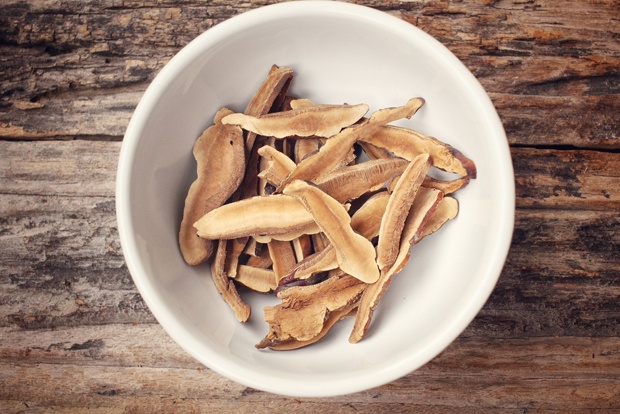
How can a mushroom be good for your skin? After all, they may taste good on your pizza, but on your skin, how could they create any benefits?
Turns out that one particular mushroom-the Reishi mushroom-has been used for thousands of years in eastern medicine for a number of health benefits. In fact, the word “reishi” actually means “spiritual potency,” as this mushroom was once known as the “herb of immortality.”
What better ingredient to slow the affects of aging on the skin?
What is the Reishi Mushroom?
Scientifically termed the “lingzhi” mushroom, the reishi belongs to the fungal species of the genus Ganoderma, and is native to East Asia, where it’s been a staple in traditional Chinese medicine for thousands of years.
It grows wild on decaying logs and tree stumps, and has a dark color, glossy exterior and woody texture. It likes hot and humid conditions, and is found in many wild varieties in the subtropical regions of the Orient. Because it’s rare in the wild, today, most of our reishi comes from mushroom farms.
What are the Health Benefits of Reishi?
Strangely enough, reishi is rarely used for cooking. That’s because it has a bitter taste that most don’t find appetizing. Instead, it’s used mainly for medicinal purposes, containing an number of nutrients and compounds that are good for the human body.
Traditional Chinese medicine believed reishi could rejuvenate body and mind, increase strength and agility, and even extend life. They called it the “mushroom of immortality,” as well as the “medicine of kings.” It was also used to treat liver disorders, high blood pressure, and arthritis.
Today, we’ve gotten excited about reishi again because modern-day research has discovered it may hold the potential to help us stay healthier in a number of ways. The Memorial Sloan Kettering Cancer Center, for example, states that reishi may stimulate the immune system, reduce inflammation, and treat lower urinary tract symptoms.
A number of studies have also tested reishi for its anti-cancer properties, and found that it may help slow the growth of cancer cells, as well as ease chemotherapy-induced nausea.
How Reishi Benefits the Skin
Reishi also holds some magical benefits for the skin. That’s because it has a number of unique compounds that can act directly on skin to produce positive effects.
- Anti-inflammatory: Inflammation causes a lot of problems in skin. It’s a factor in acne, redness, rosacea, eczema, psoriasis, and premature aging. Reishi mushrooms contain “ganodermic acid” and “ling zhi 8-protein,” which are natural anti-inflammatories and anti-allergy agents. These help reduce the reactivity in skin, helping to keep it calm and healthy.
- Antihistamine: Reishi actually has antihistamine powers, which means it can reduce the risk of allergic reactions. In fact, the polyscaccharides and triterpenes found in reishi have shown in studies to help tame inflammation and calm excessive immune responses, reducing allergic reactions. Those with sensitive skin should look for reishi, as it can help tame reactions and counteract an overly aggressive immune system.
- Anti-microbial: Reishi has natural antimicrobial properties, which means it can kill bacteria that may cause problems on your skin. A 2000 study, for example, found that reishi mushrooms were the most powerful of any of the mushrooms when it came to killing bacteria, particularly Bacillus subtilis, which can cause skin infections.
- Antioxidant: Reishi has unique and potent antioxidant characteristics that can help protect skin from free radical damage. In addition to potentially delaying the appearance of aging, these antioxidants may also help to protect from UV-induced skin cancer. In fact, reishi has been accepted by the U.S. FDA as a potential cancer therapy.
- Wound healing: Reishi is also known to help speed up the healing of wounds. A recent 2014 study, for example, found that reishi extract, when compared with a povidone-iodine ointment, enhanced healing activity in skin wounds, helping to stimulate collagen production and close the wound. Researchers concluded that the extract “possesses significant wound-healing activity.”
Take all these properties together and you have a powerful ingredient that helps protect the skin from UV rays, calms inflammation and allergic reactions, helps reduce bacteria and skin infections, stimulates healing, and helps reduce the appearance of aging on the skin.
CV Skinlabs Has Reishi for You!
Wondering where you can get this miracle ingredient for your skin? You don’t have to look very far! All of our products contain the exclusive Tri-Rescue Complex, of which reishi mushroom is one of the three key ingredients. This powerful complex encourages repair and healing of damaged skin and boosts collagen production while restoring a youthful glow.
Try this “medicine of kings” on your skin today, and let us know what you think!
What do you think of the powers of reishi? Please share your experiences with this magical mushroom.
Sources
“Reishi Mushroom,” Memorial Sloan Kettering Cancer Center, https://www.mskcc.org/cancer-care/integrative-medicine/herbs/reishi-mushroom.
Immaculada Suay, et al., “Screening of basidiomycetes for antimicrobial activities,” Journal of Microbiology, August 2000; 78(2):129-140, http://link.springer.com/article/10.1023%2FA%3A1026552024021?LI=true
Dudhgaonkar S, Thyagarajan A, Sliva D. Suppression of the inflammatory response by triterpenes isolated from the mushroom Ganoderma lucidum. Int Immunopharmacol. 2009 Oct;9(11):1272-80.
Lin CY, Chen YH, Hsu HY, et al. Ganoderma lucidum polysaccharides attenuate endotoxin-induced intercellular cell adhesion molecule-1 expression in cultured smooth muscle cells and in the neointima in mice. J Agric Food Chem. 2010 Sep 8;58(17):9563-71.
Emily Steiner, “How Reishi Combats Aging,” Life Extension Magazine, February 2013, http://www.lifeextension.com/Magazine/2013/2/how-reishi-combats-aging/Page-01.
Gupta A, et al., “Wound healing activity of an aqueous extract of the Lingzhi or Reishi medicinal mushroom Ganoderma lucidum (higher Basidiomycetes),” Int J Med Mushrooms, 2014; 16(4):345-54, http://www.ncbi.nlm.nih.gov/pubmed/25271863.

